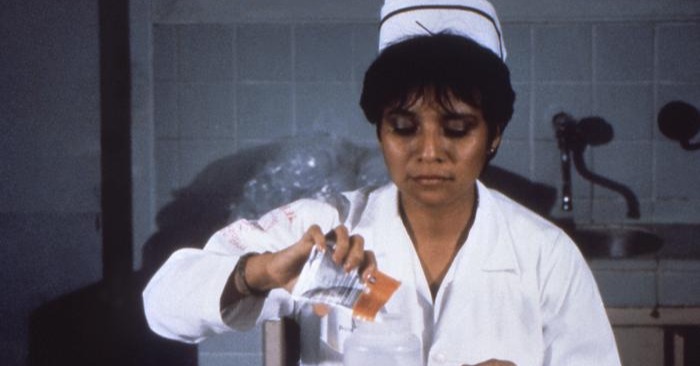
How Much Does a Doctor of Occupational Therapy Make?
In the occupational therapy field, a doctorate can open doors [...]

Aspiring nurses of all types know that gaining nursing credentials and skills is the ticket to a career path with staying power. Becoming a nurse is one of the top career paths for job security—one the Bureau of Labor Statistics (BLS) predicts will grow 12 percent through 2028, much faster than the average for all occupations.
According to Statista, roughly 2.2 million registered nurses were employed in the United States in 2001. This number grew to 2.8 million in 2016 and just under 3 million in 2018. In some of the most in-demand nursing specialties, the urgency for niche nurse practitioners finds causation in an aging baby boomer population’s need for care as well as a myriad of new cutting-edge technology and research that has created opportunities for new and innovative work in the field.
While registered nurses (RNs) make a comfortable median annual wage of $71,730, many earn additional certifications and advanced degrees—and in some cases, both—to specialize in an area of the field that allows them to take on greater responsibility, boost their earning potential, and go even deeper into what they love to do.
To help you make the call on which career direction best suits you, take a look at these nursing specialties not only for their ability to help you take your practice to new levels of patient care, but also offer some of the highest earnings in the field. Keep in mind that pay does vary based on location and employer, which makes the salaries listed a baseline to consider as you form your career plans.
Certified registered nurse anesthetists play a crucial role in a variety of medical procedures and often perform similar work as anesthesiologists in that they administer anesthesia to patients during medical procedures. With specialized training in anesthesia, CRNAs are responsible for monitoring patients throughout their entire anesthesiologic experience, which includes performing the physical assessment of patients, discussing surgery and recovery before procedures, administering and monitoring anesthesia during surgery, and ensuring that patients make a smooth recovery before they’re transferred to a care unit.
To become a CRNA, you’ll need to be prepared to hit the books—hard. After completing a bachelor’s degree in nursing (BSN) and passing the NCLEX-RN exam to become licensed as an RN, CRNAs have historically pursued at least a Master of Science in Nursing (MSN) program in Nurse Anesthesia.
However, a 2015 publication from the Council on Accreditation of Nurse Anesthesia Educational Programs states that “All accredited programs must offer a doctoral degree for entry practice by January 1, 2022. On January 1, 2022 and thereafter all students matriculating into an accredited program must be enrolled in a doctoral program.” Meaning, by 2025, nursing anesthesia graduates will likely be expected to hold doctoral degrees.
There is a small window of opportunity to become a CRNA before the change. RNs can enter a two-year master’s program before 2022, work for at least a year in a critical or acute care setting, pass the Certified Registered Nurse Anesthetist Exam, and become practicing CRNAs. Once it closes, prospective CRNAs will need to complete a Doctorate of Nursing Anesthesia Practice (DNAP) or Doctorate of Nursing Practice (DNP) program to begin work in their specialization.
Due to their advanced training and the weight of their responsibilities, CRNAs generally earn the highest pay of all nursing professions. The BLS reports that those in the specialization make a median annual wage of $167,950. An added benefit, job security for this profession is also rock-solid, with the overall employment of nurse anesthetists projected to grow 26 percent by 2028.
The role of the family nurse practitioner is the nursing specialization that functions most similarly to a primary care physician. FNPs typically perform many of the same tasks as MDs, working in a medical office, hospital, clinic, or facility to deliver family-focused care. Given the rather broad nature of their focus, family nurse practitioners offer a wide range of healthcare services that revolve around the family, from health promotion and disease prevention to direct care and counseling.
These practitioners have “full practice authority” in 22 states, meaning that they do not have to work under the supervision of a doctor. In the reduced or restricted practice states, FNPs must obtain the supervision of a medical doctor to complete certain aspects of patient care. Nevertheless, they are increasingly becoming integral to medical teams as a greater number of healthcare facilities are utilizing their expertise and unique approach to patient care.
In addition to being an RN, family nurse practitioners must have at least an MSN degree and nurse practitioner licensure as specified by their state’s board of nursing. Once practicing, family nurse practitioners can expect a median annual wage of $107,030 as well as an estimated 26 percent job growth in their specialization by 2028.
As a provider of direct mental healthcare services, psychiatric nurse practitioners utilize theoretical, scientific, and clinical expertise to manage patients’ mental health. Their responsibilities include diagnosing mental illness, and planning and facilitating treatment, which includes prescribing medication when needed. These practitioners may also assume the role of stand-in therapist, manage the delivery of psychiatric services, and act as a support for patients and their families.
To become certified as a psychiatric NP, nursing professionals must hold an MSN degree specializing in psychiatric healthcare, current registered nurse licensure, and certification from the American Nurses Credentialing Center. Nursing professionals who wish to specialize even further might opt for master’s programs in child, adolescent, gerontological, substance abuse or forensic psychiatry. Some PNPs go on to earn a doctoral degree within their specialty to land leadership nursing roles in clinical as well as academic settings.
PayScale reports that psychiatric nurse practitioners make an average annual salary of $104,260. PNP practice is in demand across in-patient psychiatric facilities, state psychiatric facilities, correctional facilities, mental health centers, as well as home health locations and schools, motivating the specialization’s projected 26 percent job growth through 2028.
Helping mothers give birth safely is possibly the most crucial aspect of a certified nurse midwife’s job. In doing so, they help patients manage their labor, monitor the wellbeing of both mothers and babies during delivery, and in some cases, work under the supervision or in collaboration with physicians during C-section births. CNMs also provide guidance to women in areas of family planning, gynecology, and prenatal care.
While nurse-midwives could enter clinical practice with a valid RN license and a BSN degree before 2010, current aspiring professionals must complete an MSN degree from an accredited program and then earn certification with the American Midwifery Certification Board (AMCB).
There are currently over 6,500 CNMs working in the United States, and according to BLS, employment within the specialization is on the rise with an estimated 26 percent growth over the next eight years. Those practicing within the specialization can expect a median annual wage of $103,770.
A pain management nurse is a registered nurse who works exclusively with patients who suffer from chronic pain and post-procedural pain to help them manage their discomfort through a variety of interventions and techniques. They work within a healthcare team to help determine the cause of the pain and the proper course of treatment while educating patients about pain management and avoiding dependence on any prescribed medication. They may work with patients who have a variety of conditions, including diabetic nerve pain, spinal cord injuries, migraines and headaches, degenerative disc disease, and cancer.
Those interested in pain management specialty should obtain a nursing degree through an Associate’s Degree in Nursing (ADN) or BSN program followed by the NCLEX-RN examination to begin work as a registered nurse. While an advanced degree isn’t necessary, sufficient experience as an RN is required to pursue certification as a pain management specialist.
According to job and recruiting site Indeed, pain management nurses pull in an average of $103,434 per year. Pain management nurses can work in healthcare settings ranging from hospitals and clinics to rehabilitation centers and nursing homes, making demand within the specialization is strong. BLS reports that jobs for pain management nurse—like all RNs—is set to grow 12 percent by 2028.
Do you have a calling to work with the elderly? Many nurses do and, due to the aging baby boomer population and the U.S.’s overall increase in average lifespan, their work will remain in high demand in the coming years. Since older patients have a unique set of health issues requiring specialized care, the duties of a GNP require multi-focal expertise, creativity, and compassion.
From restorative and preventative to palliative care, this specialization focuses on working with senior care, home health aide and hospice services to provide primary healthcare for senior patients, which includes delivering services such as diagnoses, examinations, and prescriptions, sometimes while working closely alongside geriatric physicians.
Like many nurses and the populations they work with, GNPs are instrumental in helping their patients and their loved ones navigate the complexities of healthcare. They also provide emotional support to caregivers supporting patients with complex symptoms such as sensory impairments, memory loss, and immobility. They may also play the role of facilitator when it comes to a patient’s or family’s decisions surrounding long term care, life support, end of life care, and organ donation.
An advanced specialty, gerontology nurse practitioner positions require a minimum of an MSN degree in addition to RN licensure. Some aspiring GNPs may choose to earn a DNP degree. Some of these programs are structured as an MSN-DNP, providing registered nurses with a fast-track to advanced practice nursing careers in gerontology.
When it comes to salary, PayScale reports that those in this specialization make an average of $94,446 yearly. Demand in this area is consistent with the BLS’s predictions for all nurse practitioners: an expected 26 percent growth through 2028.
The role of the clinical nurse specialist encompasses five major responsibilities: Clinical practice, research, teaching, consulting, and management. While nurse practitioners focus on patient care, a major task of working as is to CNS is to ensure NPs have the knowledge, skills, processes, policies, supplies, and equipment they need to provide safe and effective patient care. As leaders, they may help develop cost-saving strategies to deliver care and apply their observations and experience in patient care to healthcare research and policies.
Becoming a clinical nurse specialist requires an MSN degree. Because nursing is such a varied industry, prospective CNSs typically choose a specialty within the field. Once students complete their program, they’re eligible to take a national certification examination that aligns with the patient population they studied in their graduate program.
Predictably, working as an expert within a healthcare team comes with attractive pay. According to PayScale, clinical nurse specialists pull in an average salary of $89,509 annually—and can expect 26 percent job growth by 2028.
(Last Updated on February 26, 2024)
Questions or feedback? Email editor@noodle.com

In the occupational therapy field, a doctorate can open doors [...]

A lot of factors come into play. Think: demand, specialization, [...]

A Doctor of Nursing Practice (DNP) degree qualifies you for [...]

The Doctor of Nursing Practice (DNP) is a terminal practice-level [...]

Psychiatric mental health nurse practitioners (PMHNP) can create treatment plans, [...]
Categorized as: Advanced Practice Nursing, Nurse Practitioner, Nursing & Healthcare